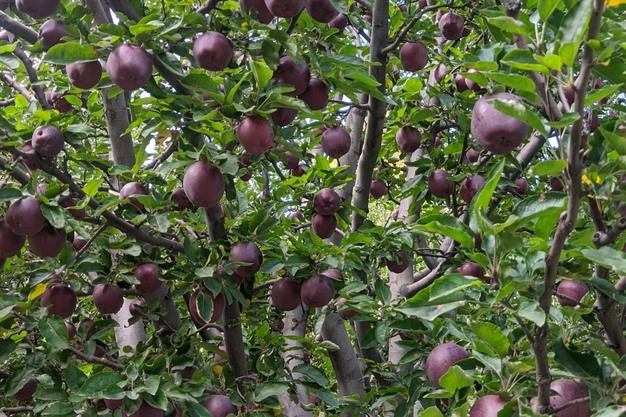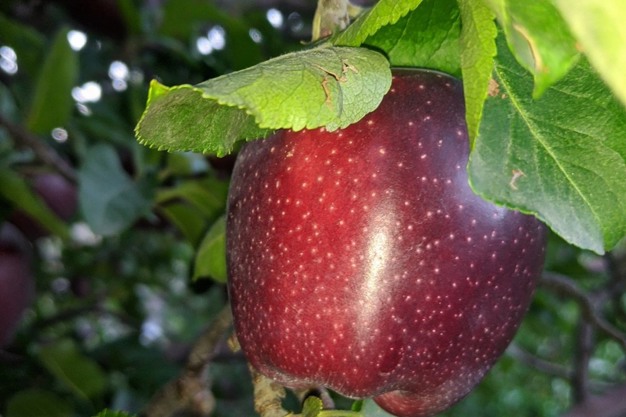After having spoken about the current situation for the organic apple cultivation in India last week, this week Ashish Banerjee, Chief Business Officer of Indian organic apple trader KGF Organic Farms, will take a look at the future and opportunities for the organic apple sector. According to Banerjee, the outlook is a positive one: "The future of organic apple cultivation in India looks promising, driven by several key factors that will contribute to its growth and development. I have some main expectations about the prospects and opportunities."
Banerjee expects the cultivated area for organic apples to increase in the coming years in the apple-producing regions of India. "The acreage dedicated to organic apple farming in India is likely to expand, as demand for organic produce continues to rise, particularly in urban markets. Farmers in apple-producing regions like Himachal Pradesh, Jammu & Kashmir and Uttarakhand are expected to transition more towards organic farming methods as time goes on. Government schemes such as the Paramparagat Krishi Vikas Yojana (PKVY) will further encourage this shift, by offering financial support and guidance."
According to Banerjee, cultivating apples in an organic manner is only going to become easier as knowledge and equipment evolves: "As organic farming techniques continue to improve, yields are expected to increase. Better pest management, soil health and cultivation practices will contribute to higher-quality apples. While weather patterns will continue to be a challenge, farmers will become better equipped to mitigate risks through sustainable farming practices, leading to better overall production. The adoption of technology in organic apple farming is expected to grow. Innovations in irrigation systems, pest control and crop monitoring will help boost productivity and improve apple quality. Additionally, advances in cold storage and supply chain management will reduce post-harvest losses, ensuring fresher organic apples reach the market in better condition."

As cultivation methods will improve, so will the knowledge on the best way to getting these organic apples to the consumers, Banerjee explains. "The marketing and distribution of organic apples will become more efficient as the demand for organic products grows. With more retail outlets and e-commerce platforms focusing on organic produce, Indian-grown organic apples will have broader access to both local and international markets. Retail chains, supermarkets, and online platforms are expected to increase their offerings of organic apples, making them more accessible to a wider consumer base."
But what about the fact that organic apples are more expensive? Aren't most of the Indian consumers priced out? Banerjee expects this will change once the cultivation of organic apples becomes more efficient: "Although organic apples typically cost more due to the nature of their cultivation, the price gap between organic and conventional apples may narrow, as organic farming methods become more efficient. Increased yields, better economies of scale and reduced production costs will help make organic apples more affordable for a larger segment of consumers, especially as demand for organic products grows."
But it won't just be the domestic market in India that provides opportunities for organic apples. Banerjee thinks the organic apples also have a place in the export markets. "The global demand for organic apples is increasing, and Indian organic apples are well-positioned to tap into this market. Indian farmers already export apples to countries in the Middle East and parts of Europe, and with improved quality control and certification, they could expand into new international markets. Organic apple exports have the potential to grow, particularly in regions with high demand for organic produce."

Banerjee thinks that the issue of climate change will also contribute to the shift towards organic cultivation of apples: "As environmental concerns about conventional farming practices rise, the shift towards sustainability is likely to fuel the demand for organic apples. Growing awareness among consumers, particularly in urban areas, about the ecological benefits of organic farming will continue to drive the sector's growth. This eco-conscious trend will further support the long-term success of organic apple cultivation in India. In summary, with increased adoption of organic farming practices, technological advancements, better market access, and growing consumer awareness, organic apple cultivation in India is poised for significant growth in the coming years."
And so, the production of organic apples is heading towards an inevitable upwards trend, Banerjee says. And farmers are also financially incentivized, he emphasizes. "While precise acreage data can be difficult to track, it is evident that the trend toward organic apple cultivation in India is steadily growing. More farmers are making the shift from conventional to organic farming practices, primarily driven by the higher prices organic apples can command. This transition is contributing to a year-on-year (YOY) growth of around 3–5% in the acreage dedicated to organic apple cultivation. The financial incentive of better prices for organic apples is a key motivator, especially in regions where apple farming is a significant activity, such as Himachal Pradesh, Jammu & Kashmir and Uttarakhand. As farmers recognize the profitability and increasing market demand for organic produce, this shift toward organic farming is expected to continue and potentially accelerate over the next few seasons."
"Government policies that promote organic farming, such as subsidies and technical support, along with rising consumer demand for organic products, will likely further drive this trend. The overall acreage under organic apple cultivation is expected to grow in the coming seasons, benefiting from these economic, market, and policy dynamics," Banerjee concludes.
This was part 2 of a report on the organic apple cultivation in India. To read the first part, which speaks about the current situation in India, please click here.
For more information:
Ashish Banerjee
KGF Organic Farms
Tel: +91 8600165706
Email: ashish@kgforganicfarms.com
www.kgforganicfarms.com

